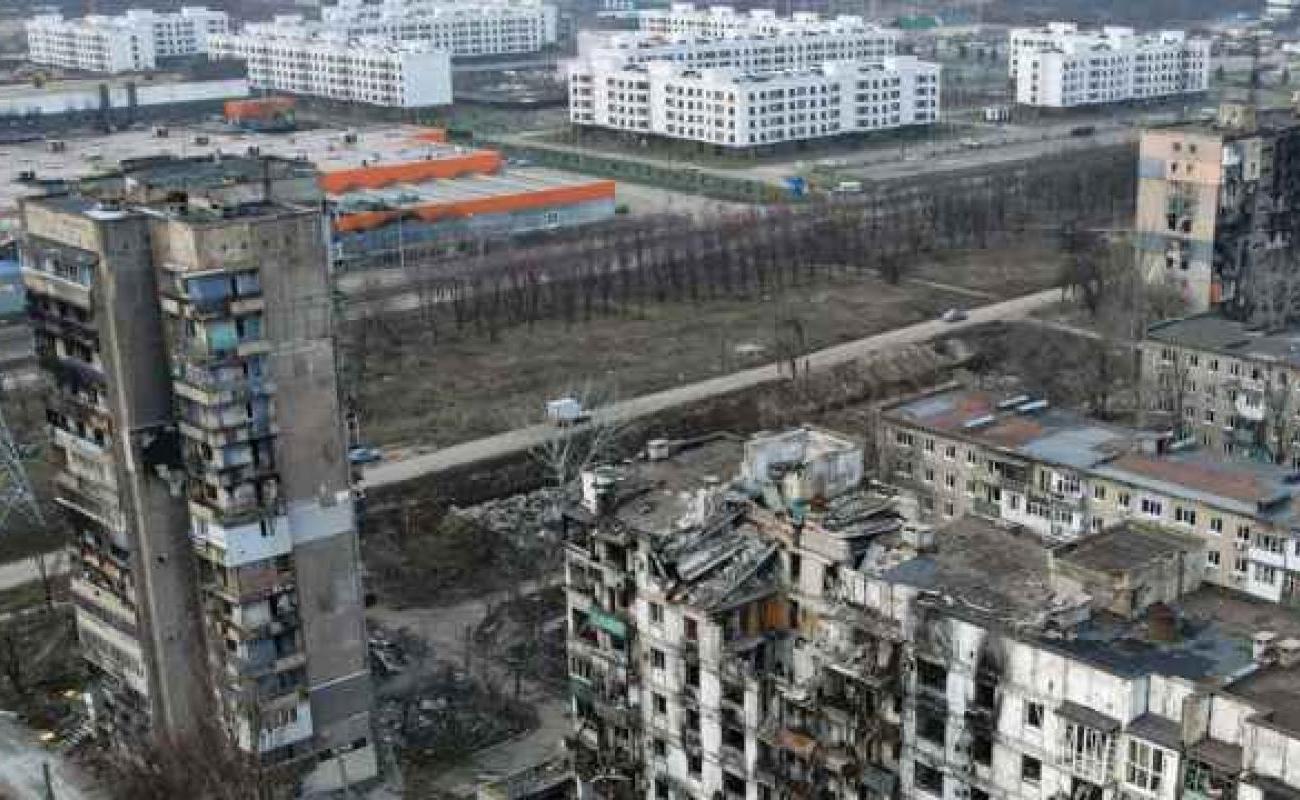Russia legally steals 20,000 homes in razed Mariupol — then charges homeless victims for rent

Mariupol residents line up with “HOMELESS BUMS” signs, begging Vladimir Putin for help on camera. Three years after Russia “liberated” their city.
The irony cuts deep. Russian propagandists claimed they brought liberation to Mariupol when they seized the southeastern Ukrainian city in May 2022 after a devastating three-month siege. More than 8,000 civilians died in the bombardment, according to Human Rights Watch, though the real figure is likely much higher.
Russia achieved its “objective” and returned what “belongs to them,” as propagandists love to emphasize. But the survivors now accuse their liberators of theft.
Russian TV cameras focus on newly erected apartment buildings, presenting an image of normalcy. Zoom out, and the broader picture reveals the burnt and bombed schools, hospitals, and homes that surround these showcase developments—a city of ruins with fresh paint on select corners.
This angle on Mariupol would not show President Putin in favorable light, the hardened leader of Russia for over 20 years, so the Russians are fed with pompous news of renovations, reconstructions and opportunities.
The residents who survived the siege tell a different story. In video after video, they hold signs reading “HOMELESS BUMS” and “RETURN OUR HOMES,” accusing Russian authorities of seizing their properties and transferring valuable land to Russian developers at prices locals cannot afford.
Property rights vanish as occupation authorities declare homes “ownerless” and transfer them to state control for resale to newly-arriving Russians. The very people Russia claimed to liberate now beg their liberators to stop stealing from them.
Russian independent news agency Astra spoke to residents who feel betrayed and abandoned by a government that ignores their complaints. These are their stories.
Russia simply ignores appeals for justice
The most recent video appeals coincided with the so-called “birthday” of the “DNR,” a Russian puppet state, on 11 May, when Mariupol residents voiced their frustration, stating they have no “festive mood” as the occupying authorities continue to seize their homes and property and focus on building mortgage housing for incoming Russians.
“To our great regret, the residents of Mariupol have found themselves in the role of the captured and enslaved,” one local woman emphasized in a video appeal.
The woman stated that the “DNR” Constitution was written with reference to the Constitution of Russia, however, it also includes a lot of regulations, decrees and other bylaws that “not only contradict both Constitutions but grossly violate them.”
“The ‘DNR’ authorities have taken away and continue to take away our apartments and houses. Almost all small businesses have been raided. Multiple appeals to law enforcement agencies have not yielded any results,” she added.
Residents of two apartment buildings on Kuprina Street addressed the Russian parliament directly, declaring: “Over the past three years, everything that has happened in Mariupol is a raider seizure of our property.”
Desperate for solutions, residents have organized protests, filed lawsuits, and submitted collective appeals to various Russian officials. According to Astra, 453 people signed one appeal to Alexander Bastrykin, head of Russia’s Investigative Committee. Residents went even to the extreme measures writing to Russian President, Prime Minister and Human Rights Commissioner — all to no avail.
According to Radio Liberty Ukraine, such appeals are recorded several times a month, but Russian authorities and state media consistently ignore them. When seeking assistance from Russian officials, one woman was reportedly told:
“Russian Federation laws don’t apply to you, you have DNR laws. Go to Kyiv and make your claims there. Russia doesn’t owe you anything.”
The reality of life in the puppet republic seems less idyllic than propaganda portrays. People in the freshly seized areas live in an unrecognized state, overseen and supported by Russia but not fully integrated into the country, while they remain legally part of Ukraine.
Your house survives bombing. Bureaucracy finishes the job.
The systematic appropriation of property operates through multiple interconnected legal mechanisms designed to ensure displacement appears administrative rather than punitive.
The foundation was laid immediately after occupation when, on 8 July 2022, authorities declared invalid all real estate documents issued by Ukrainian notaries and government offices between 11 May 2014 and 19 February 2022. This single decree stripped property rights from anyone who had purchased, inherited, or transferred property during Ukraine’s period of control — essentially invalidating eight years of legal ownership.
A resident from Uzbekistan told Radio Liberty Ukraine how this affected her family:
“My husband and I bought a house in 2015, and we also ended up without a house, according to their laws. Not only can we not get there with our Ukrainian passports, but because the house was purchased in 2015, this agreement is now considered invalid.”
